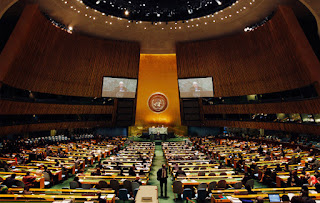Intergovernmental Organizations Vs. Nongovernmental Organizations
After the period of colonialism, many counties became nation-states with clear demarcated borders. The states have been modernized by internal and external factors. Moreover, trade across the border and continents has been increased significantly. Therefore, the world has been complexly interdependent. While states are independent states and interdependent on each other, many issues have been occurred, however. Many types of organizations, such as Intergovernmental Organizations and Nongovernmental Organization, have been created to respond to those problems. Since Intergovernmental Organizations and Nongovernmental Organization have played key role in national and international system, they have a similarity and two differences.
Intergovernmental Organizations and Nongovernmental Organizations have a commonly similarity. IGOs and NGOs greatly rely on states’ finance and supports, especially superpowers’. The states determine actions and fates of IGOs. United Nations, for example, can stand only if states contribute finance. Moreover, without supports from states, IGOs are never effective.
For instance, League of Nations failed because the United States did not join. Similarly, NGOs can work with the finance provided. In addition, like IGOs, NGOs cannot exist if states do not allow them to be in their countries. For example, communist countries do not allow some NGOs, which work for political purposes. Clearly, both IGOs and NGOs heavily depend on states for economical and physical supports.
Despite the similarity above, there are two significant differences between Intergovernmental Organizations and Nongovernmental Organization. The first difference of the two organizations is their formers. Intergovernmental Organizations (IGOs) are formed by states. States come together to form an organization, and they establish a structure based on a formal instrument of agreement. For instance, ASEAN was basically formed when the ten nations in Southeast Asia joined. However, Nongovernmental Organizations (NGOs) are generally private, voluntary organizations whose members are individuals or a group of people. Usually, NGOs are created to solve specific issue. One of many is Mother Nature Cambodia. It is a non-profit organization, which is a Cambodian movement of environmental activists, fighting for the protection of the Areng valley and the Cardamom mountains, according to Mother Nature Cambodia’s official Facebook page. The second difference is legality. Since IGOs are formed by states, they are always legal. IGOs can be established only if they follow and get recognition from international laws and other states. However, some NGOs are illegal organizations. When a group of people finds something in common, they form an organization. An example concludes terrorism organizations, such as the ISIS, IS, and Al Qaeda. They are formed, by Islamic people, in order to instill fears to people and act against governments. In short, the two differences, namely their formers and legality, differ the IGOs and NGOs.
To summarize, although Intergovernmental Organizations and Nongovernmental Organization have a similarity, there are two differences between them. The source of finance and support for them is from states; therefore, without states’, the two organizations cannot exist. However, for the differences, while IGOs are created by stats join together and while IGOs are always legal, NGOs are formed by common people, and some are illegal. To be more effective to solve problems occurring in the world, it is recommended that IGOs and NGOs work closely and have a connection with each other.

Lo and Behold ! The 5th Boodha incarnate has landed in Khmer land ! dindooohindoo
ReplyDeletehttps://dindooohindoo.page.tl/Disaster-of-Khmer-Education-and-their-Rationality.htm
Y do Campoochean Limpet Limpdicks "have the 5 th Boodha"
Boodha Pose
Another Sample
http://www.cambodiadaily.com/news/man-claiming-to-be-buddha-under-pressure-to-explain-himself-65573/
http://www.cambodiadaily.com/news/fake-buddhas-followers-defend-his-teachings-65792/
He calls "himself the Maitreya" - and has "made a statue of himself" also !
TX
ReplyDelete